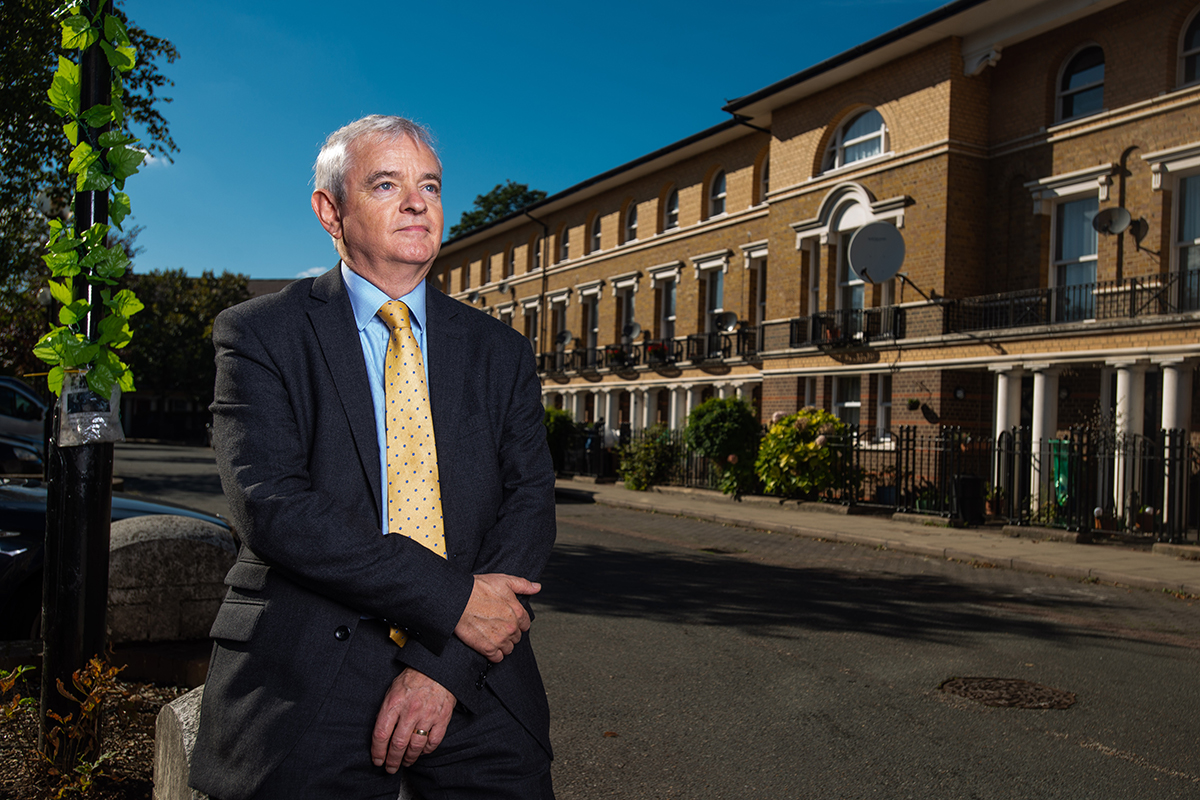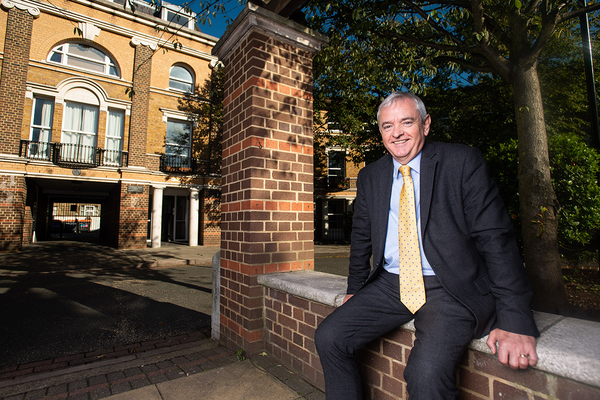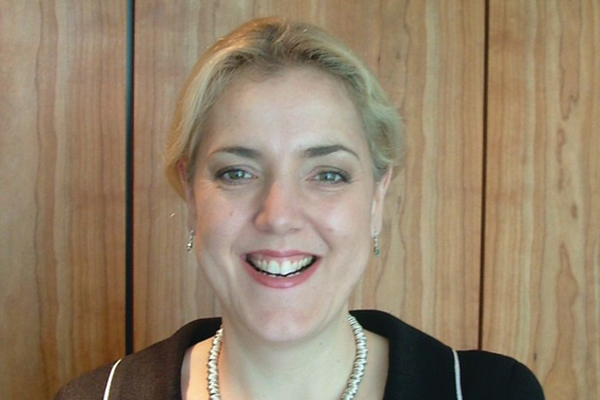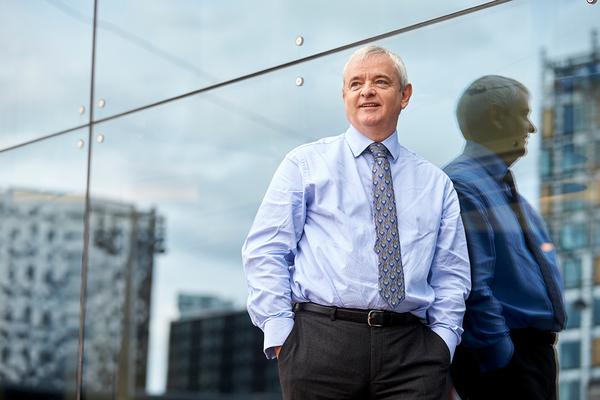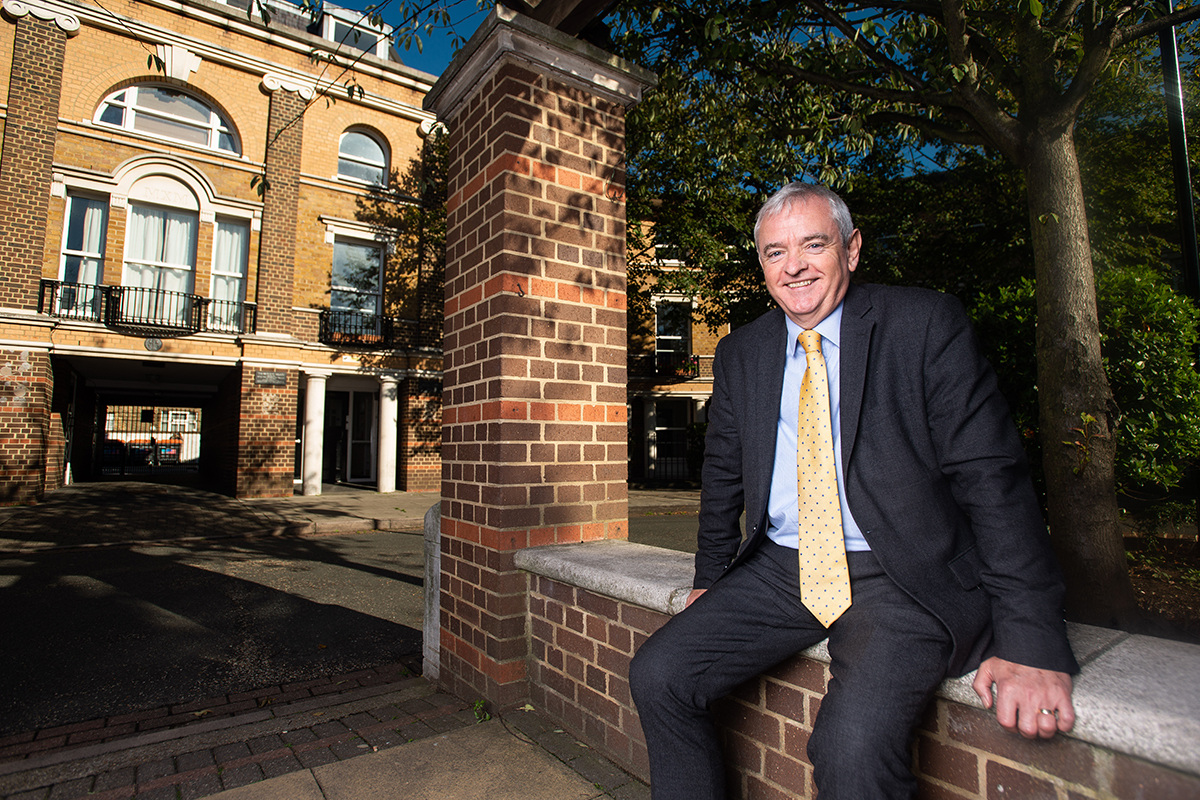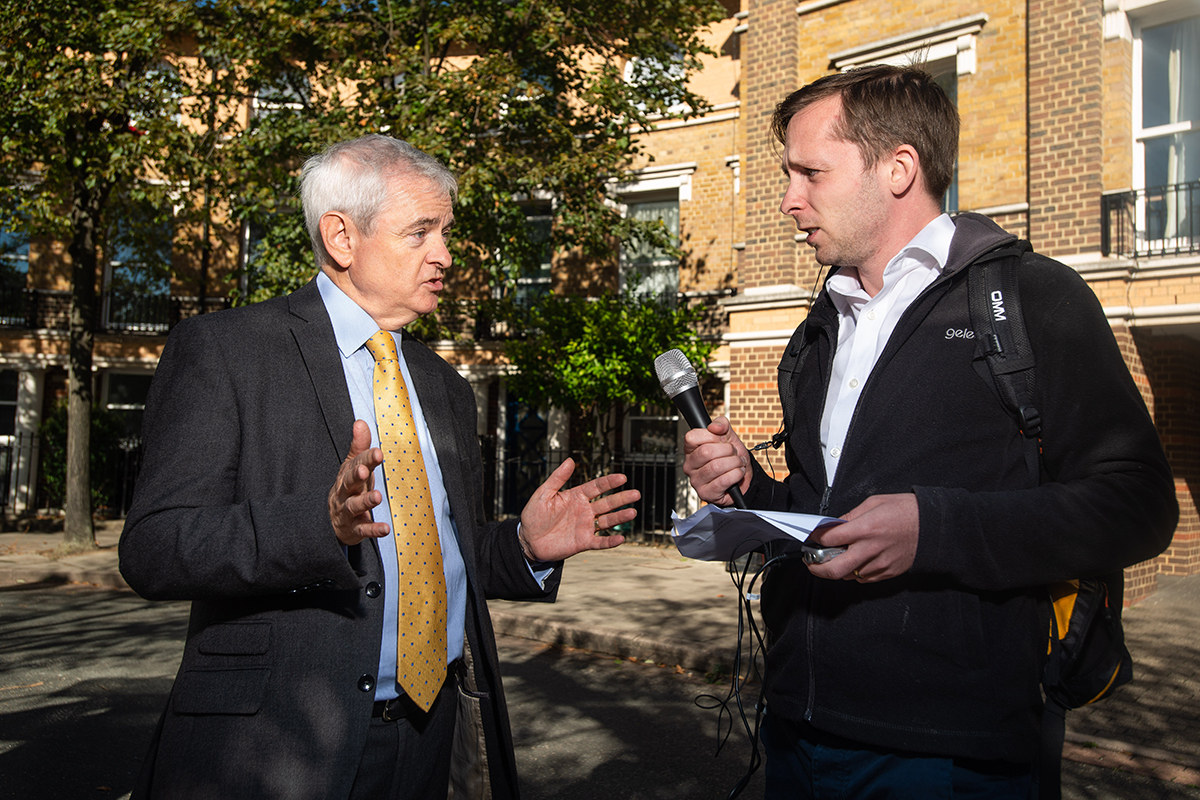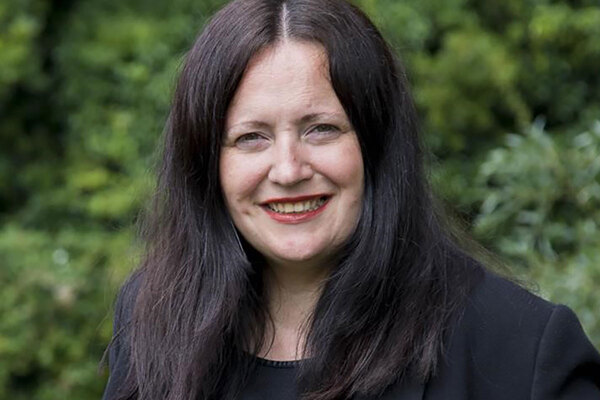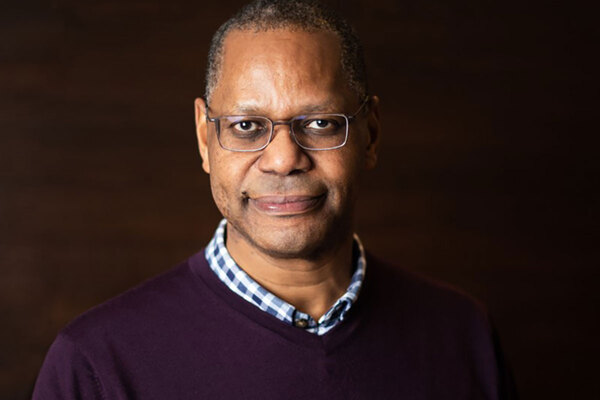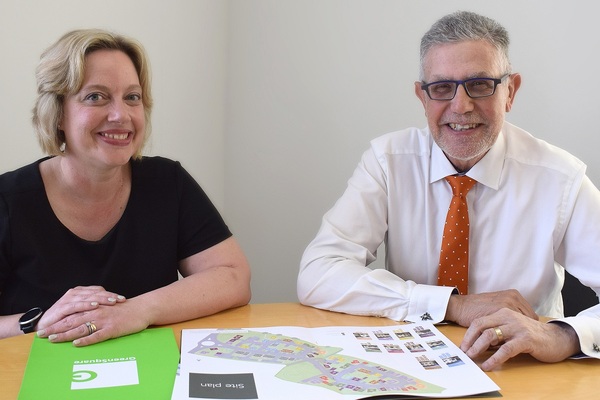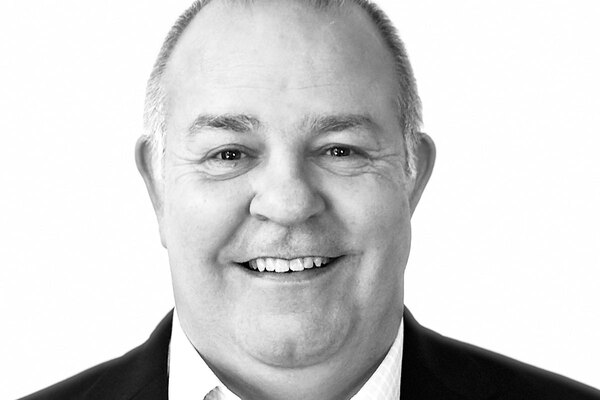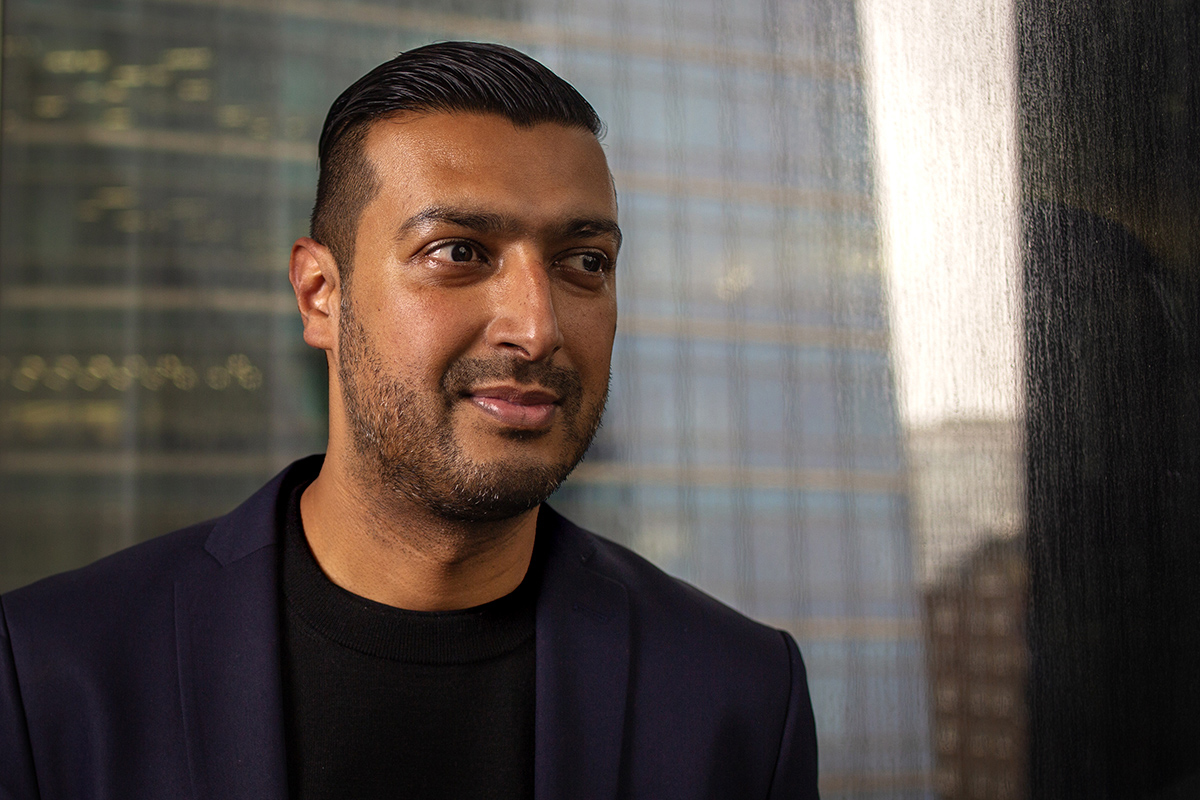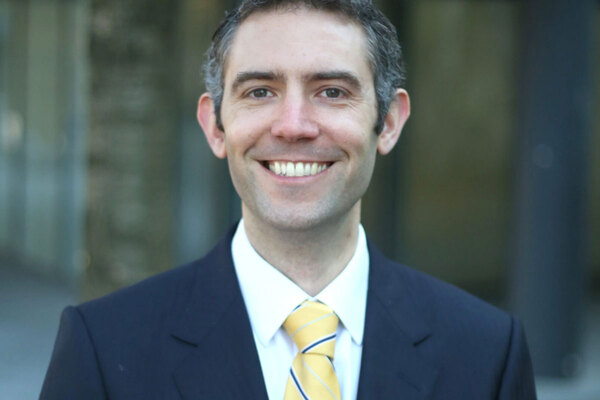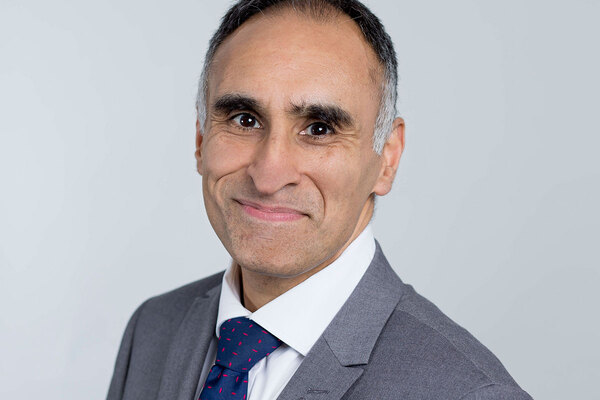You are viewing 1 of your 1 free articles
David Orr: the end of an era
David Orr’s 30-year career in the housing association world has come to an end. Peter Apps meets him to look back on his time as the sector’s leading man. Photography by Simon Brandon
“I finish next week,” says David Orr, when Inside Housing asks if he is enjoying his first day of freedom. “Do you really think I’d be doing this if I didn’t have to?”
Well, perhaps. In his 13 years leading the National Housing Federation (NHF), even through highs and lows, Mr Orr has always given the impression that he is quite enjoying himself.
He is certainly leaving on a high.
Last week, Theresa May took a break from her Brexit wars to pay a glowing tribute to Mr Orr at the National Housing Summit in London – quite the turnaround for a man once described by a Conservative Party source as “that little socialist from the Nat Fed”.
But now it is all over. Mr Orr’s 30-year career in the housing sector is coming to an end, and to mark it Inside Housing has joined him for a journey back in time.
We meet at The Mother’s Square in Hackney. This is a gated, traditional looking London town square – neat Georgian-style three-storey houses with a peaceful courtyard, faux columns and balconies. It looks expensive and exclusive. It is in fact an estate of social rented, supported
living and shared ownership homes.
The development, on the site of a former hospital, was completed by Newlon Housing Trust in 1990 – under the stewardship of their young chief executive, a rising star in the sector by the name of David Orr.
“Thirty years on it still looks great,” says Mr Orr. “I think that’s what good mixed tenure should be – there’s no way of knowing from the outside whether it’s rented or for sale.”
This is one of his go-to phrases to describe the benefits of what housing associations do, and a key part of the philosophy he has spent 13 years trying to explain to the highest levels of government.
“I think that’s what good mixed tenure should be – there’s no way of knowing from the outside whether it’s rented or for sale.”
Perhaps the ultimate compliment Ms May paid to him in her speech was to repeat it back to him from the podium, almost word for word.
Long before he was being namechecked by prime ministers, Mr Orr was growing up in Oxgangs, then a relatively new urban extension to the south-west of Edinburgh.
The area was mostly council housing, but Mr Orr lived in tied rented accommodation, a consequence of his father’s job as the local church minister. It is his parents – his mother was a primary school teacher – who Mr Orr cites when asked who have been the key inspirations in his life.
“I’ve said on a number of occasions that I see my dad as the best community worker I’ve ever met,” he says. “He very much saw his job as not just about the congregation who came to the church, but the whole community of Oxgangs.
“Oxgangs had drug problems, it had a gang. Certainly in my childhood, in my early teenage years, they were quite scary,” he says. “My parents did so much in that community that I think helped create a sense of cohesion.”
This early upbringing has stayed with him.
“The values that I have stem from that family upbringing and what my parents taught me,” he says. “I don’t have a Christian faith any longer but I absolutely believe that many of those values underpin my approach.”
Learning to care about social and community issues as a child led Mr Orr to a degree in social administration, a homelessness charity in Glasgow, and then the Centrepoint homelessness charity in London where he worked for the early years of his career.
"Asked what kind of housing association chief executive he was he answers, in a heartbeat, “brilliant”."
Mr Orr recalls this period in his career fondly. He recollects with laughter the story of a homeless man who reacted to seeing the Prince of Wales by shouting “fuck me, it’s a fucking Prince”; he remembers the stories of “unbelievably difficult” childhoods of some of the people he worked with and recalls wrestling with the debate about turning people away (Centrepoint operated a strict policy of a maximum of three nights’ stay).
After nine years working as a project manager for Centrepoint, he wanted to “do something more strategic” rather than deal with the “immediate problem” of homelessness. He had worked with housing associations for the charity, chaired the board of a London-based provider and believed a housing association was a place he could make an impact. So aged 31, having never held a job in the sector before, he applied to be chief executive of Newlon.
“I thought I could be a chief executive,” he says. “Somewhat to my astonishment, and somewhat to their astonishment, the board of Newlon agreed.”
This is a trait which runs through David Orr’s career – a fairly extraordinary and apparently innate sense of self-belief. Asked what kind of housing association chief executive he was he answers, in a heartbeat, “brilliant”. Is he unusually self-confident?
“Yeah I think that’s probably true,” he says. “I think throughout my career one of the things I’ve talked about a lot is confidence, self-confidence.
“When I was asked to chair the board I remember looking round and thinking ‘who round this table do I think could do this job better than me’, and truthfully the answer was no one.”
After a four-year stint running Newlon, Mr Orr set his sights on something bigger. He said he had learned he was a “pretty good public communicator” and wanted to put the talent to good use.
“I’ve always been interested in the politics of all of this,” he says. “I discovered that I’m a strategic rather than an operational thinker.”
"I’ve always believed in talking to people honestly. I think politicians have respected me for that."
This stage of his career began at the Scottish Federation of Housing Associations, before moving to the NHF in 2005. As well as public speaking, this introduced lobbying into his role.
How did he feel the first time he sat across the table from a powerful politician?
“Maybe it’s something to do with my upbringing, I’ve always believed in talking to people honestly. I think they [politicians] have generally respected me for that,” he says. “So many people in these environments are Home Counties-educated and don’t ever want to say anything people disagree with, so you leave a meeting not knowing what was even discussed.”
He has always been a performer; he recalls a vivid memory, aged four, of belting out There’s a Hole in the Bucket at a Sunday School performance. “I remember everyone laughing and I really enjoyed that,” he says.
Quickfire interview: David Orr’s one-sentence answers
How would you describe a housing association to someone who has never heard of one?
We provide good quality homes and great neighbourhoods for people on low incomes.
Why is there a housing crisis?
We haven’t built enough homes!
What’s your one piece of advice for successor Kate Henderson?
Just enjoy it – actually the last thing she needs is my advice.
Favourite book, film, album and sporting moment?
Book – The Mayor of Casterbridge by Thomas Hardy
Film – The Last Picture Show, 1971
Album – Brothers and Sisters by The Allman Brothers Band
Sporting moment – Hearts beating Rangers 2-1 to win the Scottish Cup in 1998
Rate your time as NHF chief executive out of 10?
10/10 for how much I’ve enjoyed it. For how I’ve done… I’m going to give myself a solid 8.5.
Can I tempt you to share a view on Brexit now that you’re retiring?
[Long, long pause] I think a no-deal Brexit would be a catastrophe, I really do. That’s as far as I’ll go!
It is this nature that he has carried through into his speech-making, moving steadily to the note-free showpieces he is now known for.
“I want people to be inspired and I want them to feel good about themselves, and I want them to be challenged. I think I generally get it right,” he says with characteristic self-belief.
He says he “does not bang on about social housing” around his family. Nonetheless, much as he inherited his father’s belief in community work, his children seem to have inherited his passion for campaigning: of his three children, his son Lawrence runs fundraising projects for the charity Scope, while his daughter Rachael recently left a senior job at Oxfam to take a role as director of housing sector umbrella body Placeshapers.
“My other daughter runs a dance school – she escaped,” he says.
In the early years of the coalition government, Mr Orr fought high-profile battles with government. The housing minister post at the time was filled by Grant Shapps – a man Mr Orr did not get along with. “Anyone who knows me knows who my least favourite politician is,” he says, which is a thinly veiled hint at Mr Shapps.
“I got a phone call from Grant Shapps the day before the 2010 Comprehensive Spending Review trying to persuade me that he’d done a great job because he’d retained one-third of the capital investment budget for housing,” he recalls.
The Mother’s Square, Mr Orr’s vision for mixed-tenure development
“I don’t care how necessary austerity politics were, no one else was getting a cut of two-thirds, and it just so clearly demonstrated where they’ve had social housing in terms of their priorities. And it came from Shapps in that same conversation that they still wanted us to build the same number of houses. I was not going to say this was great, I just wasn’t.”
It was around then that the NHF fell out of favour with central government. Inside Housing would get phone calls from officials briefing against the organisation and Mr Orr personally. Looking back though, Mr Orr is adamant that its lobbying position was justified – particularly on welfare cuts.
“I’ve never made any secret of my dislike of the bedroom tax,” he says. “It’s just poor policy and badly thought out.”
The turning point in his relationship with government was one of the most controversial moments in his career: the voluntary deal to extend the Right to Buy to housing associations in 2015. This is a topic we have covered in depth in a previous interview, but Mr Orr has not changed his mind.
“I didn’t then, and I don’t now think, that there was any available alternative. All of the available alternatives were worse than doing a deal,” he says.
Did the criticism which came his way hurt? “I don’t believe anyone doesn’t feel it a bit when there is such deeply personal criticism,” he says. “But I’m chief executive of the NHF and there are some occasions, a very small number of occasions, where you just have to trust your instincts, that’s what I’m paid for.”
The years following the deal have been busy: Brexit, a change of tone from the government on housing, and last year Grenfell – which Mr Orr describes as a “nightmare”. He has not shied away since from challenging the sector, particularly over what he describes as “a belief that demonstrating compliance is enough” on safety.
And so, after 13 years, it is time for the curtain call. Mr Orr says he will “not leave the world of housing associations completely”, and would consider chairing an organisation again.
He also plans to read more, learn to play the saxophone and spend more time with his grandchildren.
Has his time at the helm of the sector been a success? The environment for housing associations is clearly positive, but real change has been slower. As Mr Orr himself said in his big closing speech, there are twice as many children in temporary accommodation now as at the time Cathy Come Homewas filmed. On most metrics, the housing crisis is getting worse.
“I think what I’ve managed in both of those jobs is to keep hold of a central core narrative about housing associations, and I regard it as a success that I’ve been able to do that,” he says.
“There are things that I still feel deeply frustrated about. At times it felt like crying into the wilderness trying to make the case for housing.
“But I wasn’t the architect of a whole series of decisions which led to the situation we have now. I have just tried to make sure those decisions didn’t have too negative an impact on the work that housing associations do.”
How does he feel about the future? “I am an incorrigible optimist,” he says. “We’re in a much, much more positive place than we’ve been for a very long time.”
Politics is complex and cause and effect are difficult to establish. But there are those in the sector who would give more than a little credit for this positive place to a certain self-confident, optimistic, evangelical performer from Oxgangs.
